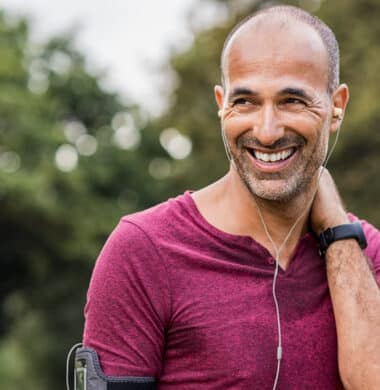6 Tips for Exercising Outdoors with a Heart Condition

With the warm weather returning to Colorado, many people are shifting their workouts back outdoors after months inside. The ability to exercise outdoors while engaging in a variety of activities is one of the many things that make Colorado an attractive place to live. Exercising outdoors can provide significant health benefits and is recommended even if you have a heart condition. However, it’s important to understand that extra precautions are required when exercising outdoors with a heart condition to ensure you remain safe and don’t put excessive strain on your heart. This is especially true once we reach the peak summer heat.
The following tips will help you remain safe when exercising outdoors with a heart condition.
Speak to Your Cardiologist Before Exercising Outside
Always check with your cardiologist before starting to exercise outdoors when the weather gets warm. This will ensure you’re armed with the information you need to exercise outdoors safely with a heart condition. Talk to your doctor about the types of activities you plan on doing outside to ensure they are safe for individuals with a heart condition. This conversation is also a great opportunity to ask any questions you may have about exercising safely outdoors.
Some potential questions to ask your cardiologist include:
- What is the optimal duration of outdoor exercise with a heart condition?
- How often can I exercise outdoors each week?
- Are there any specific types of outdoor exercises that will be safer for my heart condition than my preferred outdoor activities?
- Are there specific activities I should avoid when exercising outdoors?
- Will I need to modify my medications if I’m exercising outside?
Be Strategic About the Times of Day You Exercise Outdoors
While exercising outdoors does have benefits and can be safe when you have a heart condition, the time of day you choose to exercise outdoors is critical to safeguard your heart health. Exercising outdoors in extreme temperatures can place additional strain on your heart and make breathing more difficult. This can increase your risk of a cardiac event if you have a heart condition.
To avoid any risks to your heart health posed by hot weather, it’s best to exercise early in the morning prior to the peak heat of the day or in the evening after the heat has broken. By exercising outside during cooler times of the day, you can minimize your risk of any adverse effects on your heart. Keep in mind that high humidity can also increase fatigue, so it’s best to avoid exercising outdoors when it’s very humid.
Stay Hydrated

To avoid these risks, it’s critical that you take the proper steps to stay hydrated whenever you exercise outside in hot weather:
- Drink 16 ounces of water within the hour prior to exercising outdoors to ensure you’re starting in a well-hydrated state
- Drink water regularly during exercise
- When exercising for more than an hour, supplement water with a sports drink to replace electrolytes that are lost through sweat
Start Slow and Progress Gradually
Outdoor exercise impacts your body in different ways than indoor exercise, especially during the heat of summer. Inside, you’re in a controlled environment that typically maintains an optimal climate for exercise. Outside, you have no control over the climate. When you haven’t exercised outside in months, your body isn’t used to the ways the heat can place strain on your systems, and it can take time for your systems to adapt to the ways in which heat effects your body.
To avoid forcing your heart to work extremely hard and undergo significant strain, it’s best to start slow when first transitioning back to outdoor exercise. Engage in gentle to moderate exercise for short durations at first and gradually work your way up to more intense sessions of rigorous physical activity. This will help your body acclimate to outdoor conditions without forcing your heart to strain.
Once your body is used to exercising outdoors again, you should still start all exercise sessions with a gentle warm-up for at least five minutes to prepare your heart for the rigorous workout that is about to come.
Choose Outdoor Activities that Are Safe for Individuals with a Heart Condition

- Brisk walking
- Light to moderate cycling
- Swimming
- Hiking on easy to moderate trails
- Golf
Listen to Your Body
While you want your heart to work a little harder when you exercise, you don’t want to overwork your heart. This is especially true with outdoor exercise in the heat. When you have a heart condition, it’s especially critical to listen to your body when exercising outdoors. Stop exercising immediately if you experience any of the following symptoms:
- Excessive fatigue
- Shortness of breath
- Dizziness
- Chest pain
- Rapid or irregular heartbeat
If these symptoms don’t go away shortly after you stop exercising, seek medical attention right away since they might be a warning sign of a potential cardiac incident.
South Denver Cardiology Associates Can Help You Maintain Optimal Heart Health
At South Denver Cardiology Associates, we’re committed to helping you live a heart healthy life. If you have a heart condition, our cardiologists can perform comprehensive diagnostic testing to evaluate the condition of your heart and advise you as to the types of outdoor exercise that you can perform safely. You can also work with the exercise specialists at our medical fitness gym to develop a customized outdoor exercise program that will improve your cardiovascular health.
Contact us today to schedule an appointment. We serve patients in South Denver, Littleton and the surrounding areas.
- 9 Tips to Reduce Holiday Stress - December 11, 2025
- 6 Tips for Exercising Outdoors with a Heart Condition - May 19, 2025
- Lifestyle Changes That Can Help Manage Arrhythmia - April 30, 2025
Sign Up
As with any health concerns, your specific treatment program should be discussed thoroughly with your primary care physician as well as any specialists who may need to be consulted – like a cardiologist.
Sign Up
